Iran Denies Flight Restrictions Amid Israeli Threats
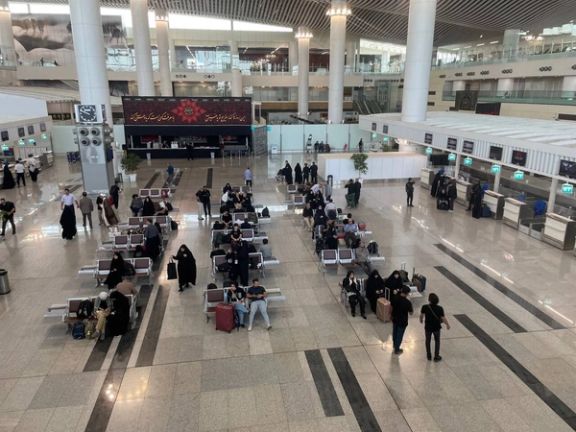
In the wake of Israel's declaration of retaliation to Saturday night's aerial bombardment, Iran Airports and Air Navigation Company denied any flight restrictions at Iranian airports.

In the wake of Israel's declaration of retaliation to Saturday night's aerial bombardment, Iran Airports and Air Navigation Company denied any flight restrictions at Iranian airports.
On Monday evening, Israel's Military Chief of Staff, Herzi Halevi, confirmed that Israel would retaliate, though specifics of the response remain undisclosed. "This launch of so many missiles, cruise missiles, and drones into Israeli territory will be met with a response," Halevi said during a briefing at the Nevatim air base which had minor damage following the strike.
Israeli Prime Minister Benjamin Netanyahu has been actively consulting with his war cabinet, having convened meetings twice in less than 24 hours to discuss potential responses to Iran’s recent attack in which 99 percent of the projectiles were intercepted by Israel and its allies.
It was the first direct strike from Iranian soil to the Jewish state, bringing its shadow war into the forefront of the region's geopolitics. Two air bases were among the targets and one seven-year-old Bedouin girl remains in a critical condition from shrapnel injuries.
Iran launched the assault as a response to what it claims was an Israeli airstrike on its embassy compound in Damascus on April 1, emphasizing its intention to avoid further escalation.
The ongoing developments have stirred concerns among Iranians, many of whom are already grappling with economic challenges and increased socio-political restrictions following the protests which began in 2022.
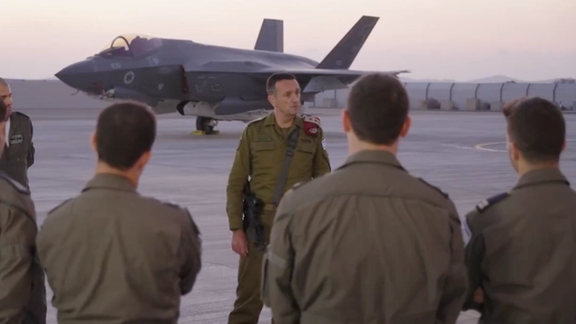
Israel and Iran exchanged warnings and threats Monday, as the US government set out to contain the looming Israeli attack, fearing that a tit-for-tat between could lead to an all-out war.
Several Israeli officials have stated that Iran’s larger-than-expected attack would not be left unanswered, even though 99% of all Iranian missiles and drones were intercepted by Israeli defense systems and allied air forces.
“Iran will face the consequences for its actions,” Israel Army Chief of Staff Gen. Halevi said in a video statement. “We will choose our response accordingly."
At the same time, pressure from Europe and some Arab counties might force Israel to adopt a retaliatory strategy the would be less likely to lead to a major escalation.
This was the clearest indication of Israeli intentions after the war cabinet, headed by prime minister Benjamin Netanyahu, met twice in less than 24 hours to weigh their options. No details were offered officially, but Israel’s Channel N12 News claimed that the response would likely be one that hits the Iranian regime in a way that doesn’t trigger an even bigger response.
Anticipating the attack, Iran went on the propaganda offensive.
Iran's deputy foreign minister Ali Bagheri Kani said any Israeli attack would be responded to in “less than a few seconds". A member of Iran’s Islamic Parliament (Majles) went further. "We are prepared to use a weapon that we have never used," said Abolfazl Amouei, the spokesman for the Majles’ National Security Committee, urging Israel to "act wisely".
Experts and unnamed Israeli officials have suggested several ‘possible’ courses of action: large-scale cyber-attack, hitting Iranian proxies, or covert operation inside Iran. This would not surprise many, since several Iranian nuclear scientists have been killed inside Iran in the past, and there have been mysterious explosions in nuclear facilities and other strategic locations.
Israel never took responsibility for these incidents and never denied it either. Now also, Israel could attack important targets and keep silent, not putting the Iranians in a situation to be forced to respond.
Whatever the Israeli response, it will likely be consulted with the Americans, according to media reports in Israel. The Biden administration has said it will not take part or assist in the Israeli operation, downplaying the significance of the Iranian attack and highlighting Israel’s success in thwarting the offensive almost entirely.
"What we showed on Saturday night was that Iran is not militarily superior, is not 10 feet tall, and that Israel is not alone," White House National Security Council spokesman John Kirby told NBC News Monday, when asked if he agrees that Iran would be emboldened without a response.
The administration’s stance has angered Biden’s more hawkish critics, who have accused him of ‘appeasing’ Iran and ‘abandoning’ Israel.
“Sadly, Iran isn't worried about the United States,” former national security advisor John Bolton told Newsmax. “They don't see Biden as having the spine to cross Iran's red line of not attacking Israel directly.”
Officials in Iran maintain that Israel’s attack on Iran’s consulate in Damascus crossed a red line and had to be responded to restore deterrence. The Israeli response would test this idea –and potentially trigger a cycle of retaliatory attacks that could spiral into a full-scale war.
“We’re on the edge of the cliff and we have to move away from it,” EU foreign affairs High Representative Josep Borrell said in a radio interview. “We have to step on the brakes and reverse gear.”
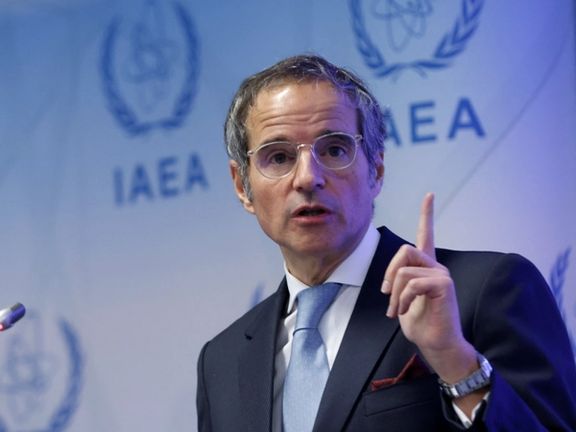
UN nuclear inspectors in Iran have stayed away from related facilities since Sunday, amid threats of an Israeli attack, the head of the UN nuclear watchdog, the IAEA said on Monday.
Rafael Grossi, director of the International Atomic Energy Agency, told reporters in New York that Iran had closed its nuclear facilities on Sunday over “security considerations.” While they reopened on Monday, Grossi said he kept IAEA inspectors away “until we see that the situation is completely calm.”
After Iran targeted Israel with a massive barrage of around 350 drones and missile on Saturday/Sunday night, Israeli leaders have vowed retaliation. The United States, European powers and some regional counties have urged Israel to exercise restraint, but Israel military and political officials have vowed to restore deterrence.
“We are going to resume tomorrow,” Grossi added. “This has not had an impact on our inspection activity.”
Asked about the possibility of an Israel strike on Iranian nuclear facilities, Grossi said, “We are always concerned about this possibility.” Grossi also urged “extreme restraint.”
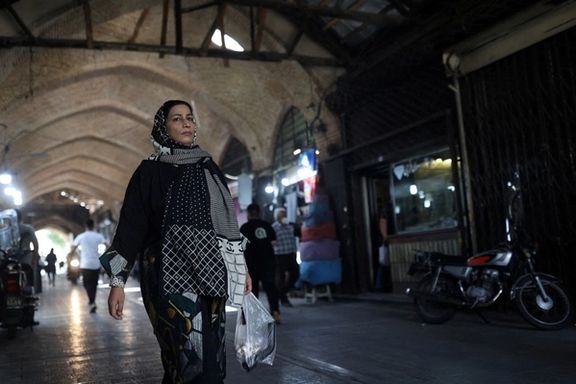
Iranian commentators and media anticipate a gloomy year ahead for the country’s economy, largely attributing the outlook to government inefficiency and the immense pressure of US sanctions.
Meanwhile, analysts warn that the situation is exacerbated by the government’s apparent lack of a plan to tackle longstanding economic crisis.
Yahya Ebrahimi, a lawmaker from Delfan has said in an interview with Rouydad24 website that that if the situation remains unchanged and the government does not come up with an effective initiative, the US dollar can rise from around 650,000 rials to 1000,000.
He bemoaned the vanishing middle class in Iran, emphasizing that a considerable segment of the population now falls below the official poverty line. He highlighted President Raisi's unfulfilled promise made at the outset of his term in 2021, pledging to safeguard the country's economy from dependence, even on the unlikely prospect of improved relations with Washington. However, Ebrahimi criticized Raisi for failing to uphold this commitment.

According to Ebrahimi, Raisi's assurances regarding economic progress no longer hold weight, given the evident rise in prices, housing costs, and exchange rates, which starkly reflect the economic conditions. He further contended that the actual inflation rate far exceeds the government's reported figure of 40 to 50 percent.
Moreover, Ebrahimi asserted that government mismanagement has inflicted greater harm on the economy than the US sanctions.
Meanwhile, according to a Khabar Online report, housing costs in Iran are poised to escalate further unless the government urgently addresses the housing crisis. The report reveals that the price per square meter of housing units in Tehran surged to 810 million rials (around $1,300) in March 2024, marking a 24.8 percent increase compared to March 2023.
Kianush Goudarzi, Chairman of Tehran's Estate Agents Union, explained to Khabar Online that the spike in housing prices is primarily linked to the surge in exchange rates. Additionally, he noted that given the overall rise in prices across various sectors, an increase in housing costs is expected and natural.
In an article published in Etemad online, former government spokesman Ali Rabei underscored the grim outlook across all sectors, warning of the looming threat of social instability in Iran due to mounting unemployment and poverty. He emphasized, "Unemployment and poverty breed economic insecurity, which in turn fosters social unrest."
Rabei lamented that despite the availability of jobs, the government's low wage policies have left many unemployed individuals disinterested in seeking employment. Moreover, he highlighted the disparity between the government's claims of economic growth and the lack of tangible improvements in people's livelihoods, leaving many questioning the real impact of this purported growth.
According to centrist politician Mansour Haqiqatpour, the problem is that the government has no plan whatsoever to save the country's sinking economy. He added that neither the Raisi administration, nor the parliament have any idea about how to put an end to the ongoing economic crisis.
Conservative politician Ezzatollah Yousefian Molla attributes the surge in prices to government policies, highlighting the detrimental impact of economic instability on businesses. In an interview with Nameh News, he emphasized that restoring public trust in the government is imperative to address ongoing economic challenges.
Yousefian Molla underscored the pervasive uncertainty in the market, particularly regarding fuel prices, which has stymied business confidence. He criticized the government's indecision and inaction, citing the paralysis induced by fluctuating fuel prices as a key factor exacerbating economic instability. Additionally, he pointed out that discussions surrounding potential tax hikes on businesses and individuals further contribute to the prevailing sense of uncertainty.
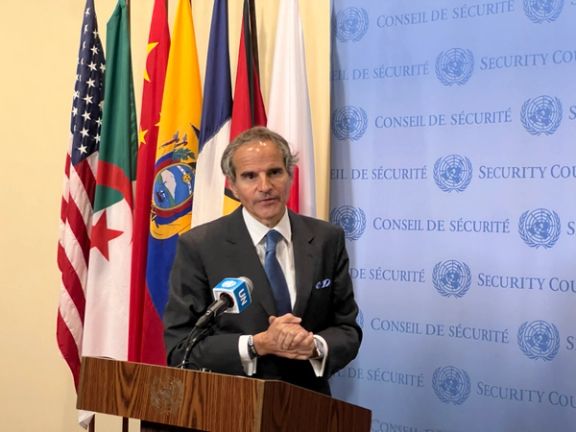
Iran shut down its nuclear facilities last Sunday over “security considerations,” UN nuclear chief Rafael Grossi has said, expressing concern over the “possibility” of an Israeli attack on Iran’s nuclear sites.
Speaking to reporters in New York on Monday, IAEA Director General confirmed that the facilities had reopened within 24 hours, but with no IAEA supervision, as the agency has decided to keep its inspectors away until the situation is “completely calm.”
Grossi was referring to rising tensions between Israel and Iran, which many fear may lead to an all-out war between the two countries and potentially engulf the whole Middle East.
Israel bombed Iran’s consulate in Damascus on 1 April, killing seven members of the Islamic Revolution’s Guards Corpse (IRGC), including a high-ranking commander and his deputy. Iran retaliated on 13 April, launching more than 300 missiles and drones towards Israel –all but a few of which were intercepted by Israel and its allies.
On Monday, Israeli officials vowed to respond to the attack. When asked about the possibility of Israel hitting Iran’s nuclear sites, Grossi said, “We are always concerned about this possibility.” He urged both sides to show “extreme restraint”.
Grossi also reiterated the IAEA’s concerns about Iran’s nuclear program.
“A bit more than a year ago, I went to Tehran and signed a joint declaration with the Iranian government indicating a number of actions that we will be taking together with Iran,” Grossi said. “We started that process and that process was interrupted. And I have been insisting that we need to go back to that understanding that we had in March 2023.”
In September 2023, Iran withdrew the designation of several inspectors assigned to conduct verification activities in Iran under the Non-Proliferation Treaty Safeguards Agreement. Iran’s nuclear chief Mohammad Eslami later claimed that those expelled had had a history of "extremist political behavior”.
“We are always urging, asking and requiring Iran to cooperate with us in full,” Grossi told Iran International’s Maryam Rahmati. “It's not that we are not there, but we are not there at the level that we consider we should be.”
The IAEA reported in February that Iran is enriching and stockpiling near-weapons-grade uranium, warning that such elevated purity cannot be explained by civilian applications.
When asked about Iran’s enrichment levels by Iran International, Grossi siad, “the fact that there is an accumulation of uranium enriched at very, very high levels does not automatically mean you're having a weapon…but it raises questions in the international community.”
Iran has always denied seeking nuclear weapons, but no other state has enriched to that level without producing them.
A report published last month by the Institute for Science and International Security claimed that Iran is moving ahead with building a nuclear site deep underground near Natanz.
“This Iranian nuclear weapons-making facility could be impervious to Israeli and perhaps even American bombs,” Foundation for Defense of Democracies CEO Mark Dubowitz said at the time. “Time is quickly running out, as Iran moves into a zone of nuclear immunity, to deny the regime permanent use of this deadly site.”
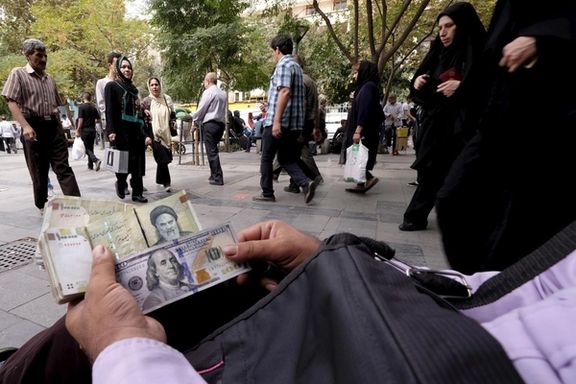
During the 2.5-year tenure of President Ebrahim Raisi, Iran has seen its liquidity double due to a 100% increase in state debts to Iranian banks, aimed at compensating for the budget shortage and current expenses.
According to a report by the Central Bank, liquidity increased by 24% during the last fiscal year, which ended on March 19, reaching approximately 80,000 trillion rials ($123 billion, based on the USD rate in open markets). This figure represents more than 30% of Iran's GDP.
Since President Raisi came into office in August of 2021, liquidity in Iran has nearly doubled, leading to rampant inflation, which escalated to 47% during the last fiscal year.
The increase in the state’s debts to Iranian banks, which forced the Central Bank to engage in uncontrolled printing of unsupported banknotes, has accelerated the rate of currency devaluation.
Yet, this month, President Raisi claimed that increased liquidity in Iran is "one of the signs of the country's economic growth".
Over the past five years, Iran’s Central Bank has ceased publishing government budget reports. But, according to the Supreme Audit Court of Iran and the Research Center of the Islamic Legislative Assembly, it is estimated that since 2018—when the US withdrew from the Joint Comprehensive Plan of Action (JCPOA) and imposed sanctions on Iran’s oil exports—the government's annual budget deficit has consistently exceeded 30%.
A detailed look at the Central Bank statistics show that the majority of liquidity is cash and short-term bank deposits, due to the accelerated devaluation.
Simply put: Iranians avoid depositing money in banks for longer terms.
The above three-year bank deposits amount is almost zero, due to the lack of trust in the government's monetary policies.
Government debts
The Central Bank of Iran reports that the government's debts to this bank jumped by 65% year-on-year to more than 3,000 trillion rials ($4.6 billion) during the last fiscal year.
In addition to the government itself, state-owned companies also owe 880 trillion rials ($1.35 billion) to the Central Bank.
The mentioned figures are only a small part of the government's debt to the country's banking system.
The report of the Central Bank shows that the total debt of the government and state-owned companies to all Iranian banks increased by 56% year-on-year to above $20 billion at the end of last fiscal year.
Despite Raisi’s campaign pledge to stop government borrowing, there has been a significant increase in the state’s debt to the banking system. Since Raisi came to power, the government's debt to the domestic banks has almost doubled.
Bank debts share only 20% of the Iranian government’s total debts.
The National Development Fund (NDF) was set up in the early 2000s with the aim of safeguarding a slice of oil revenues for the benefit of future generations, as well as to support the private sector with loans. Today, the Iranian government's debt to the NDF has ballooned to over $100 billion.
In addition, the government has withdrawn two-thirds of the NDF’s reserves to compensate for the budget deficit and finance the current expenses of state-run companies.
Notably, the National Iranian Oil Company is the biggest debtor in the country and shares about 60% of the government’s total debts.
The International Monetary Fund has calculated that the debts of the Iranian government amount to 30.5% of its GDP, which is equivalent to $118 billion, or 2.5 times the government's budget for the current fiscal year.
Iran’s staggering state debt and liquidity have led to an acceleration in devaluation, especially in recent weeks when the Iranian rial plunged to its historical lowest value. Currently, each USD is sold at about 650,000 rials, whereas at the beginning of Raisi’s presidency, it was about 230,000 rials.
Since the US withdrawal from the JCPOA in 2018, the Iranian rial has lost about 94% of its value.
The Iranian government faced an $18 billion non-oil trade (excluding services) deficit during the last fiscal year, the highest amount ever and three times more than the previous year.
While Iran experiences about $10 billion in capital flight and a $7-8 billion negative balance in service trade annually, its total oil export revenues stood at less than $36 billion during the last fiscal year. Iran sells its oil via middlemen to Chinese independent and small refineries, known as teapots, with a $13 discount per barrel.
Iran also barters its oil for Chinese goods and services.






